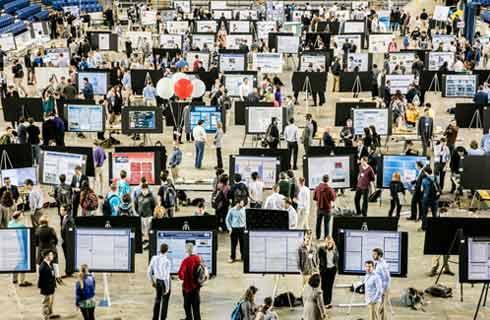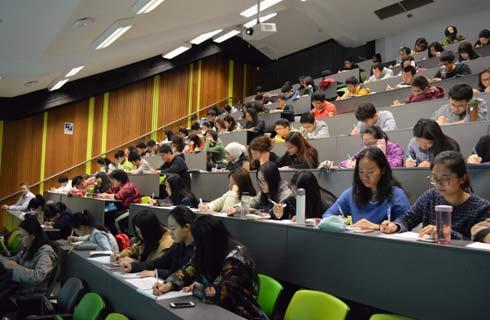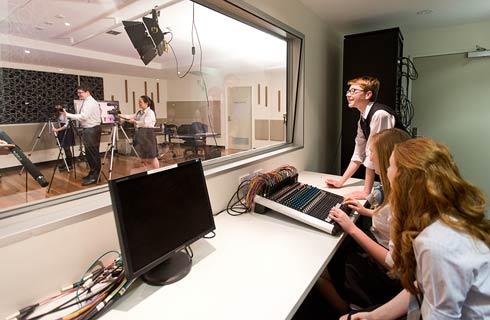国际学生入学条件
High School Transcripts.
Typically, the most important factor in the admission evaluation process is demonstrated academic achievement in a challenging secondary school program.
The admission committee looks for applicants who have completed the most rigorous academic courses available in their secondary schools and recommends that prospective students should exceed minimum high school graduation requirements. We require an official transcript. The secondary program should include no fewer than 16 academic courses and must include the following courses:
English 4 units
Mathematics 4 units
Foreign Language 2 units
Science (from among biology, chemistry, and physics) 2 units (*)
Social Studies 1 unit
A TOEFL or IELTS score should not be more than two years old. Depending on the school, most admitted graduate students attain a minimum total score of 90 on the internet-based (iBT) TOEFL (including sectional minimums of 22 in speaking, 22 in writing, 23 in reading and 23 in listening). The minimum paper-based TOEFL score requirement is usually 600, and the minimum IELTS score requirement is 7.0.
展开
IDP—雅思考试联合主办方

雅思考试总分
7.0
- 雅思总分:7
- 托福网考总分:90
- 托福笔试总分:600
- 其他语言考试:NA
CRICOS代码:
申请截止日期: 请与IDP联系 以获取详细信息。
课程简介
In an increasingly technologically driven world, the accumulation of scientific knowledge often outpaces the ability of society to understand its full meaning, both in relation to the science itself and to its impact on the human condition. This is most apparent in the fields of biological and medical research. Here, the observations, experiments and theories that comprise contemporary biology have far-reaching implications for the way humans view themselves, interact with each other, and make decisions for themselves and others. This should come as no surprise since the systematic and scientific study of the natural world has raised broad societal questions for as long as the practice has existed. Over the centuries, debates have raged about when human life begins and under what circumstances it is permissible to end it. These questions, reformulated in part by modern technology, remain important. The elucidation of evolutionary theory in the nineteenth century focused attention on the seminal questions of the origins of life and of the human species. In addition, it has had profound effects on the way we view the development of society. Not surprisingly, the stunning achievements of modern biology have also had significant consequences for society. Breakthroughs in genetics, stem-cell propagation, mammalian cloning, and applications derived from the human genome project raise numerous ethical questions. The longevity resulting from new medical treatments poses major challenges as our society tries to develop appropriate public policies for an aging population. The emergence of viral pathogens, such as HIV and Ebola, the increasing prevalence of multi-drug resistant bacteria, and the specter of biological entities such as anthrax and smallpox being utilized as agents of terrorism, raise daunting social and scientific questions. The pollution we generate causes many of the cancers that afflict us, ironically just at the time when we have acquired a fundamental understanding of the molecular causes of this disease and have made enormous strides in developing new therapies. Addressing such issues, questions, and challenges requires both an understanding of biology and its context within the humanities and the social sciences. The interdisciplinary Distinguished Majors Program in Human Biology was created for the purpose of allowing students the opportunity to examine and appreciate the extraordinary interplay between modern biology and society. The program draws its faculty from almost every school at the University, and is administered through the Department of Biology, in partnership with the Department of Public Health Sciences. Faculty from the College of Arts and Sciences, the Institute for Practical Ethics, the Center for Global Health, the Law School and the Medical School play significant roles in facilitating student research projects and participating in the 4th year capstone series. Furthermore, the individualized coursework of the major's students will bring to the program a broad survey of the scientific and humanitarian disciplines to be found across grounds. From our collective experiences, we will seek to create a tapestry of ideas from which we can approach the problems we will face in the future.
展开







 预科
预科 奖学金
奖学金 实习机会
实习机会 在校学习
在校学习 跨境学习
跨境学习 校园授课-线上开始
校园授课-线上开始 在线/远程学习
在线/远程学习














 滑铁卢大学
滑铁卢大学

 滑铁卢大学
滑铁卢大学

 滑铁卢大学
滑铁卢大学

 圣弗朗西斯泽维尔大学
圣弗朗西斯泽维尔大学

 劳伦森大学
劳伦森大学

 劳伦森大学
劳伦森大学









 美国
美国